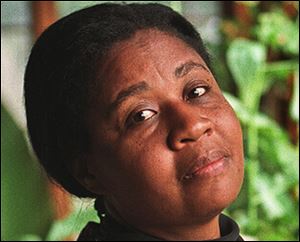
SELF-MADE WOMAN
Kincaid declared herself a writer; then proceeded to become one
3/25/2013
Kincaid
Jamaica Kincaid’s journey has been remarkable. When she (or perhaps one of her characters) was little and afraid to walk past cows on the tiny Caribbean island of Antigua, her mother told her to plunge ahead and buck up.
She’s written or edited 13 books, including the newest, See Now Then, a novel in which the protagonist, dear Mrs. Sweet, has to plunge ahead and buck up when dear Mr. Sweet informs her he loves a much younger, more beautiful woman.
Kincaid will speak at 7 p.m. Thursday in the McMaster Center of the Main Branch of the Toledo-Lucas County Public Library for the Authors! Authors! speakers’ series, sponsored by The Blade and the library.
Jamaica Kincaid
WHEN: 7 p.m. March 28
WHERE: Main Branch of the Toledo-Lucas County Public Library, 325 Michigan St. Free parking in the attached garage, entrance on Adams Street.
TICKETS: $10; $8 for students; can be purchased at the door or in advance at any library.
INFORMATION: 419-259-5266.
Her writing style has been described as having dreamlike repetition, emotional truth, and autobiographical underpinnings. Thoughts, meandering somewhere between conversation and stream of consciousness, pile poetically onto each other, stitched with conjunctions, prepositions, punctuation. Sentences often number in the hundreds of words.
From See Now Then: “...and Mrs. Sweet wept, for she had loved her life so much; and this was a surprise to her, that she had loved her life so much: the life with Mr. Sweet and his foul breath after a good night’s sleep, his slight stature, the hair on his beautifully pear-shaped head disappearing in a calculated way, as if it was being harvested for a purpose unbeknownst to human imagination...”
At 63, Kincaid splits her time between her long-time home in Bennington, Vt., and another in Claremont, Calif., an eastern suburb of Los Angeles, where she teaches three classes a year at Claremont McKenna College.
She’ll speak in her dulcet voice about growing up in a small, Third World land that was a British colony, and becoming a writer and an American, she said in a telephone interview from New York City.
As a youngster in Antigua, she lost herself in books and Ebony magazine. “I always wanted to look like an elegant black woman.”
She was Elaine Richardson, 17, when she left for New York to be an au pair (“servant” is her word). She attended college, changed her name, and wrote for the Village Voice and teen magazine Ingenue.
“I could make myself up in America. No one knew me. I thought that in America people weren’t interested in the fact that I had no proper, legitimate background. I didn’t have a father. I just could be anonymous and say I was something that I really wasn’t. I could say I was a writer and make myself a writer. So I loved that.”
Standing almost six-feet-tall, she cut an interesting figure clad in sleek vintage suits (thrift store buys from the 1930s and ’40s), with bleached-blond hair, and shaved eyebrows painted blue and green. “I looked very odd.”
“I had no idea it was possible to succeed at this ludicrous thing I was saying about myself. I said I was a writer before I could really write. Then, through a series of lucky chances, I met William Shawn [editor of The New Yorker]. He allowed me to write for his magazine,” she said. “It wasn’t until I got to The New Yorker that I began to understand writing.”
She married the boss’ son, pianist/composer Allen Shawn, and converted to his faith, Judaism. They moved to Bennington, Vt., where they taught college and raised two children, now 24 and 28, and eventually divorced.
Her first book, At the Bottom of the River, was a collection of short stories published in installments by The New Yorker. Lucy is the tale of an immigrant girl working as a nanny and trying to find herself. My Brother recounts her return to Antigua and getting to know her brother as he dies from AIDS.
Her greatest loves are her children, books (possessing them), and gardening, about which she’s produced three volumes including Among Flowers: A Walk in the Himalayas.
“I love knowing about plants. When I do something I really just keep doing it. Once I started to garden it wasn’t enough to go to a store and buy the plants. I would go and visit the gardeners who were plantsmen and talk to them and see what they were doing, so naturally I had to accompany them to get the plants.” Which entailed four weeks of hiking in the Himalayas, starting at tropical elevations of 1,000 feet and climbing to nearly 17,000 feet to search for plants suitable for Vermont’s climate.
She writes slowly and without routine, often mulling aspects of her own life and the colonial history of people who originated in Africa.
“It takes me a long time. I decide what part of a subject I’m going to write, and would it better to say it this way, because I’m always trying to say it in a new way. ... The interesting thing is certain people are not interested in the past for good reason: the past was very good to them, there’s no reason for them to wonder if it turned out differently or what if something else happened?
“For some of us, it’s not the same as it always was but it’s had such a tremendous, rippling effect on our lives. I’m not talking about something racial, but something bigger than that.”
Contact Tahree Lane at: tlane@theblade.com and 419-724-6075.